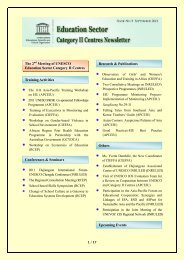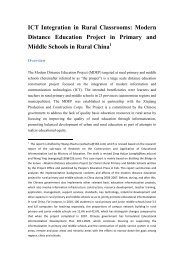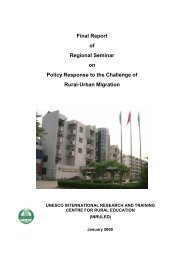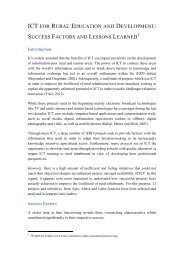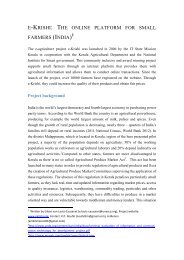Download - inruled
Download - inruled
Download - inruled
Create successful ePaper yourself
Turn your PDF publications into a flip-book with our unique Google optimized e-Paper software.
The call for the active engagement of teachers goes far beyond their roles in the<br />
classrooms. The urgent and pressing needs for them to deliver adequately as in<br />
the ZEP schools scenario also means that teachers as educators must take up the<br />
charge of educating policy makers and the public about what it actually takes to teach<br />
effectively in today’s world both in terms of the knowledge and skills that are needed<br />
and in terms of the school contexts that must be created to allow teachers to develop<br />
and use what they know on behalf of students (Fullan, 1993).<br />
4.0 Investment in capacity<br />
building of Head Masters and<br />
teachers in the ZEP sector<br />
The ZEP strategy of the Ministry of Education places a high emphasis on the project<br />
as being inclusive in nature so that no child is left behind from a perspective that<br />
every child matters. The Tomlinson Report (2004) reaffi rms the belief that learning<br />
can only be fully effective if it is inclusive. Booth and Ainscow (2000) discusses the<br />
concept of inclusion in education as being concerned with breaking down barriers to<br />
learning and increasing participation for all students, treating all learners on the basis<br />
of equality and non-discrimination. Hence actors in the ZEP scenario need to be<br />
aware of what is to be done and build competence in view to live the fundamentals of<br />
the process of making their school truly an inclusive one.<br />
In the wake of the ZEP project launching in 2002, the Ministry of Education<br />
organised a workshop with the Head Masters of the ZEP schools to critically examine<br />
their ‘taken-for-granted’ processes and procedures in order to identify the barriers<br />
towards the implementation of an inclusive socio-pedagogical policy which befi ts the<br />
nature of the project. It was then observed that changes to the practices, processes<br />
and structure of the ZEP school administration are not merely accommodations to<br />
involve a specifi c category of pupils, but are changes to unlock and engage the<br />
[ 16 ] INRULED





